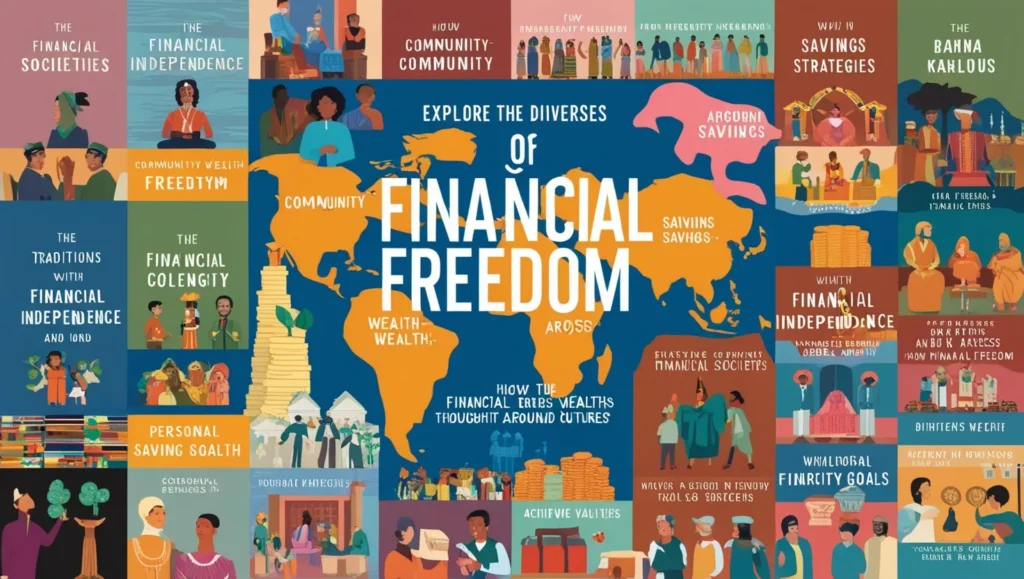Financial Freedom Mean in Different Cultures
Financial Freedom Mean in Different Cultures is a universal aspiration, yet its meaning varies widely across different cultures. It goes beyond having a secure bank balance—financial freedom reflects values, priorities, and lifestyles shaped by cultural norms and societal expectations. By exploring how different cultures define and pursue financial independence, we can gain insights into the diverse perspectives that guide people’s financial goals worldwide.
Understanding Financial Freedom
At its core, financial freedom is the ability to make choices without being constrained by financial limitations. It often includes:
- Security: Having enough savings or income to cover basic needs.
- Independence: The ability to make life decisions without financial dependency.
- Flexibility: Having the resources to pursue passions, travel, or support loved ones.
While these pillars remain consistent, cultural values significantly influence how financial freedom is perceived and achieved. Financial Freedom Mean in Different Cultures
Financial Freedom in Western Cultures
Western cultures, particularly in countries like the United States, Canada, and Australia, often equate financial freedom with independence and self-reliance.
- Focus on Individualism:
Financial freedom in these cultures often involves personal wealth accumulation and the ability to retire early, travel, or invest in personal interests. - The FIRE Movement:
Popular in Western societies, the Financial Independence, Retire Early (FIRE) movement reflects a desire to break free from traditional employment through savings and investment strategies. - Debt Management:
Reducing debt, particularly student loans and mortgages, is seen as a critical step toward financial freedom. - Emphasis on Wealth Growth:
Investment in stocks, real estate, and entrepreneurial ventures is often encouraged to create long-term wealth.
Financial Freedom in Asian Cultures
In many Asian cultures, financial freedom is closely tied to familial responsibilities and collective well-being. Financial Freedom Mean in Different Cultures
- Family-Centric Approach:
Financial freedom is not only about personal security but also about providing for one’s family. Supporting elderly parents, funding children’s education, and contributing to the household are key priorities. - Savings Culture:
Asian societies often emphasize saving over spending. People aim to build substantial savings as a safety net for unforeseen circumstances or to ensure future stability. - Entrepreneurial Spirit:
In countries like China and India, financial freedom often means owning a business or having multiple income streams to secure the family’s financial future. Financial Freedom Mean in Different Cultures - Property Ownership:
Owning a home is considered a significant milestone in achieving financial independence in many Asian societies.
Financial Freedom in European Cultures
European countries, particularly in Scandinavia and Western Europe, tend to view financial freedom through the lens of stability and quality of life rather than wealth accumulation.
- Work-Life Balance:
Financial freedom in Europe often emphasizes the ability to enjoy life experiences without financial stress. Paid vacations, flexible work schedules, and social safety nets play a role in achieving this balance. - Minimalist Lifestyle:
Many Europeans value a minimalist approach to life, focusing on essentials and sustainable living rather than materialistic wealth. - Social Benefits:
Robust welfare systems in countries like Sweden and Germany mean that financial freedom is less about individual wealth and more about leveraging societal support systems. Financial Freedom Mean in Different Cultures
Financial Freedom in African Cultures
In African cultures, financial freedom is deeply rooted in community ties and resource sharing.
- Collective Prosperity:
Financial freedom often means uplifting the community, sharing resources, and contributing to communal growth. - Entrepreneurial Focus:
Small businesses and local entrepreneurship are critical pathways to achieving financial security and independence. - Self-Sustainability:
For many, financial freedom involves sustainable practices such as agriculture, livestock, or community-driven projects that provide long-term security.
Financial Freedom in Latin American Cultures
In Latin America, financial freedom often intertwines with family and social connections, mirroring a mix of traditional and modern values.
- Multi-Generational Support:
Similar to Asian cultures, Latin Americans prioritize supporting extended families, including parents and siblings. - Entrepreneurship and Side Hustles:
Financial independence is frequently pursued through small businesses, freelance work, or informal economy activities. - Celebration of Life:
Financial freedom includes the ability to celebrate life’s moments, such as festivals, family gatherings, and other cultural traditions.
Universal Strategies for Financial Freedom
Despite cultural differences, certain strategies are universally acknowledged as steps toward financial freedom:
- Budgeting: Managing expenses and tracking income.
- Savings and Investments: Building financial reserves and generating passive income.
- Education: Learning financial literacy to make informed decisions.
- Goal Setting: Clearly defining short-term and long-term financial objectives.
Lessons from Different Cultures
- Diverse Definitions: Financial freedom is not a one-size-fits-all concept. While Western cultures may focus on independence, other societies emphasize community and family.
- Value Alignment: Understanding cultural perspectives can help tailor financial goals that align with personal values and societal expectations.
- Global Inspiration: Learning from other cultures can offer innovative approaches to achieving financial freedom, such as adopting minimalist lifestyles or focusing on community-driven goals. Financial Freedom Mean in Different Cultures
Final Thoughts
Financial freedom is more than a financial status—it’s a reflection of cultural identity and personal values. Whether it involves accumulating wealth, supporting family, or enjoying life’s simple pleasures, the journey to financial independence is as diverse as the world itself. By embracing the lessons from various cultures, we can redefine what financial freedom means to us and find pathways that resonate with our unique circumstances. Financial Freedom Mean in Different Cultures

